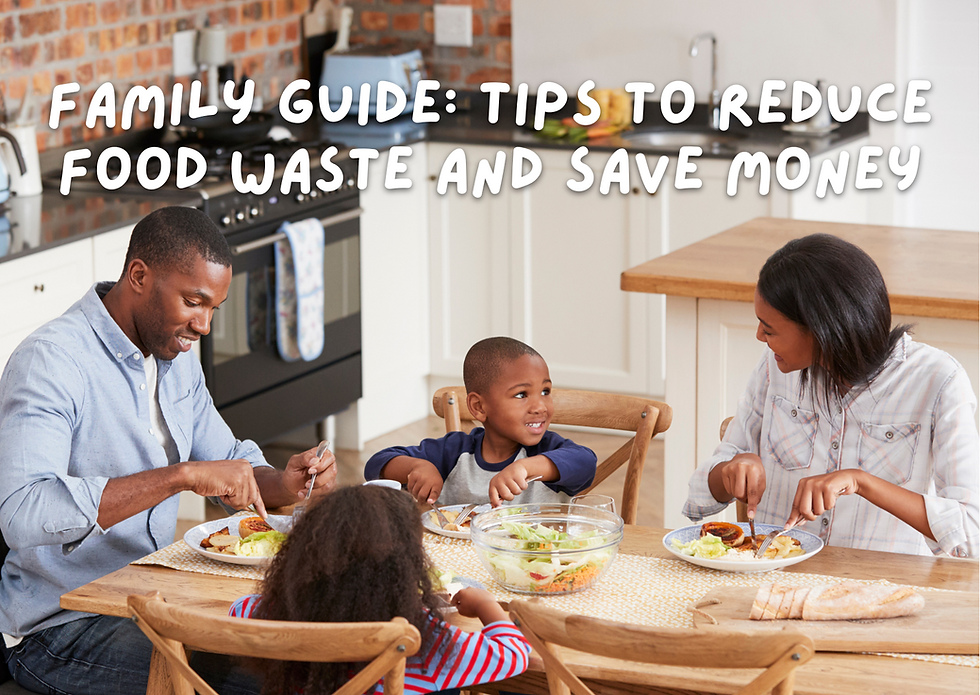Family Guide: tips to reduce food waste and save money
- Nov 3, 2022
- 4 min read

Reducing your food waste isn’t just good for the environment, it’s also good for your family budget.
It’s estimated that 9.5 million tonnes of food are wasted in the UK, that’s an average of almost £500 per household per year!
And with the cost of living crisis affecting all families this autumn and winter, even little things can make a big difference.
So to help, here are our top tips to reduce your food waste with additional resources listed below.
Let's dive straight in!
The weekly shop
Meal plan
Plan a weekly menu and take a shopping list to the supermarket so that you only buy what you need.
It’s also a good idea to use ingredients over two or more meals to make your money stretch further and reduce waste at the end of the week.
There are some handy food apps to help you with this, which we’ve listed below in the resources section.
First in, first out
When putting away shopping, put newer items at the back and move the older items to the front.
This will reduce the chance that food will pass its use by date and have to be thrown away.
Use by or best before
Know the difference between ‘use by’ and ‘best before’.
‘Use by’ means you should not eat a food item past that specified date. ‘Best before’ is a recommendation, in these cases trust your judgement: if it looks and smells ok, it’s ok to eat.

Throughout the week
Consider how you store your food
Think about how you store food and what you can do to make sure it’s as fresh as possible. For example, use an airtight container to store crackers and biscuits.
We’ve provided links to further information on this below.
Make homemade stock!
Bones and offcuts make for great bases for stocks.
If you roast a chicken, for instance, make stock from the bones. This is great for soup the next day or you can even freeze this to use later down the line.
Use up veg leftovers
Got veggies going off soon? Use what you have in the fridge to make a yummy and nutritious soup!
A great activity to do with your little one and saves on waste. We’ve listed some recipes below.
Monitor your food waste
Keep track of what you throw away each week, is there anything you throw away a lot of?
Use this information to adapt your weekly shop or your cooking habits.
The freezer can be your best friend
Freeze what you can – dinner leftovers like casseroles and pasta sauces, bread, cheese etc. can all be frozen for weeks/months. This will help extend their shelf life and help you waste less.
But be sure to check how long you can keep each item frozen. We recommend labelling these with what the food item is and the date it was frozen to help you keep track.
Skin on veg
Leave skins on potatoes, cucumbers, apples and carrots. Use florets when cooking with broccoli or cauliflower. This will not only waste less it also comes with additional nutritional benefits!

Once used/gone off
Compost bin
If you have a balcony or garden, consider composting your fruit and veg waste. Many local authorities can provide you with a compost bin. You can also compost grass clippings, garden waste and shredded paper!
This is especially handy if you have the space to grow your own fruit and veg as you can use the compost to improve your crops.
Banana bread!
If you have bananas that are getting a little too ripe, make them into banana bread! You can also freeze these and use them when you have time to bake.
This can also be done with various other fruits. We’ve included recipes for banana bread and other fruit below.
Your dog can help more than you realise
If you have a dog, then they can also help reduce food waste! They will happily eat leftover cooked veg such as carrots, sweet potatoes, spinach, green beans and sprouts.
You should not give them onions, garlic, mushrooms, grapes, raisins or rhubarbs as these can be toxic.
Feed your local wildlife
You may be surprised to find what birds will happily eat. Try filling your feeder with: grated cheese, finely chopped bacon, cooked rice, dry cereal, breadcrumbs, leftover pastry, cake crumbs, cooked potato, dried fruit or even chopped apples and pears.
Please be sure to not give them leftover cooking fat, cooked porridge or any food that is mouldy.

Resources
Meal planning
Storing food
Using leftover veg
Using leftover fruit
Food waste guides
Money saving guides




Comments